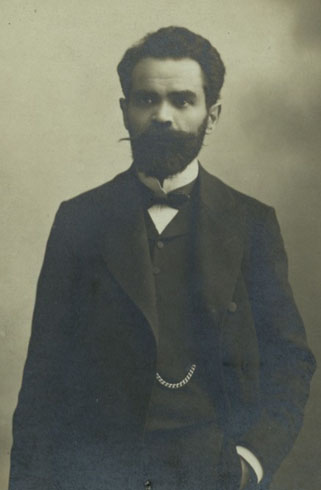Pasmanik, Daniel
Pasmanik, Daniel or Danylo [Пасманік, Данило], b 1869 in Hadiach, Poltava gubernia, d 5 July 1930 in Paris, France. Leader and ideologist of the Zionist movement in the Russian Empire. He was born into a traditional Jewish family of a melamed (children’s Talmud teacher). Having studied medicine at the University of Zurich and in Bulgaria, from 1899 Pasmanik served as a medical instructor in Geneva, Switzerland. In 1905 he returned to the Russian Empire and joined the editorial board of the Zionist monthly Evreiskaia zhizn' and later, of the weekly Razsvet. His childhood and youth are described in his autobiographical novel, Istoriia evreiskogo intellektuala (The Story of a Jewish Intellectual, 1905), that was published serially in Evreiskaia zhizn'. As seen from this novel, Pasmanik envisioned a multinational democratic Russian state in which Jews would enjoy equal rights. He supported the idea of a Jewish-Ukrainian rapprochement in the Habsburg-ruled Galicia but he did not extrapolate this vision to the territory of Ukraine under Russian rule. He was also among the first theoreticians of the Jewish socialist movement Poale Zion, which he discussed in such works as his article ‘Neklassovoi kharakter sionizma’ (The Non-Class Character of Zionism, 1904) and his book Teorie un Praktike fun Poalei Zionizmus (The Theory and Practice of Poale Zion, 1906) that proved to be particularly influential.
During the First World War Pasmanik served as a surgeon at the front. After the February Revolution in 1917, he lived in Yalta in the Crimea, where he joined the Constitutional Democratic (kadet) party and edited the party’s daily Yaltinskii golos. After moving to Simferopol, Pasmanik edited another Kadet newspaper Tavriiskii golos. In his capacity as editor, he discussed the problem of anti-Jewish pogroms and called for a struggle against Anti-Semitism. However, at the outset of the civil war in the Russian Empire, he sided with the anti-Semitic ‘White’ Army. Pasmanik’s association with the ‘Whites’ continued even after his emigration to Paris in 1919. He refused to support the Bolsheviks possibly because their economic policy was aimed at the destruction of private trade that formed the socioeconomic foundations of the life of the Jewish masses. He may have also believed that Bolshevism would destroy Russian statehood which could protect Jews from pogroms. Although leading Zionists cut all ties with Pasmanik, he never abandoned Zionism and continued to publish on Zionist topics.
From 1920 Pasmanik edited (with Vladimir Burtsev) the Paris-based daily of the ‘White’ movement, Obshchee delo. Judging from his writings, he underestimated the extent of anti-Jewish pogroms committed by the ‘White’ Army and was reluctant to write anything critical about the activities of Anton Denikin and Petr Vrangel’s troops. It is possible that, until 1923, he was unaware of the pogroms committed by the ‘Whites,’ but even later he downplayed the responsibility of the ‘White’ leadership for anti-Jewish pogroms, insisting that the ‘Whites’ were not the only ones perpetrating such attrocities. He considered the struggle against Bolshevism to be his most important political mission. Around 1923, Pasmanik embraced Russian monarchism and even wrote favourably about Italian fascism in his Counterrevolutionary Diary (1923), presenting fascism as a force that was capable of maintaining social order and preventing social unrest.
Pasmanik’s principal writings include Kritika ‘teorii’ Bunda (A Critique of the ‘Theories’ of the Bund, 1906); Sud'by evreiskago naroda: problemy evreiskoi obshchestvennosti (The Destiny of the Jewish People: The Problems of Jewish Public Society, 1917); and Russkaia revoliutsiia i evreistvo: bolshevizm i iudaizm (The Russian Revolution and Jewry: Bolshevism and Judaism, 1923). His last book Qu’est-ce que le judaïsme? (What is Judaism?) was published just prior to his death in 1930.
BIBLIOGRAPHY
Rosenberg, William G., Liberals in the Russian Revolution: The Constitutional Democratic Party, 1917–1921 (Princeton 1974)
Kleiner, Israel. From Nationalism to Universalism: Vladimir (Ze’ev) Jabotinsky and the Ukrainian Question (Edmonton 2000)
Schechtman, Joseph B. ‘Daniel Pasmanik,’ in Encyclopaedia Judaica, 2d ed., ed. Michael Berenbaum and Fred Skolnik, 22 vols (Detroit 2007)
Budnitskii, Oleg. Russian Jews between the Reds and the Whites, 1917–1920 (Philadelphia 2012)
Budnitskii, Oleg; Polian, Aleksandra. Russko-evreiskii Berlin, 1920–1941 (Moscow 2013)
Tsurumi, Taro. ‘Jewish Liberal, Russian Conservative: Daniel Pasmanik between Zionism and the Anti-Bolshevik White Movement,’ Jewish Social Studies 21, no. 1 (2015)
Larysa Bilous
[This article was written in 2022.]
